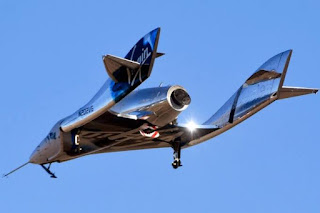Virgin Galactic said in a press release Thursday that it will delay the start of its commercial spaceflight operations until the fourth quarter of 2022 and will not conduct another planned test flight this year.
Virgin had planned to launch its first commercial test flight, Unity 23, in October, but the company said testing results of new materials prompted it to make changes to its timeline.
Virgin Galactic said "commercial service is now
expected to commence in Q4 2022." Shares in the company fell 13 percent in
afterhours trading.
The US Federal Aviation Administration (FAA) on September 2
had barred Virgin Galactic from flying its SpaceShipTwo pending completion of a
report into the flight of the Virgin Galactic rocket plane that carried British
billionaire Richard Branson to the edge of space.
Branson was among six Virgin Galactic employees who took
part in the July flight, soaring more than 50 miles (80km) into space.
The FAA on September 29 closed its mishap investigation into
the July 11 Virgin Galactic Unity 22 launch, which deviated from assigned
airspace on descent, and lifted a grounding order it had imposed earlier.
Virgin Galactic had said in September it was planning
another SpaceShipTwo flight from New Mexico, Unity 23, pending technical checks
and weather. The company said last month the earliest it expected "to open
its flight window for Unity 23 is mid-October."
But Virgin Galactic on Thursday said it will now begin its
planned enhancement programme first and will conduct the Unity 23 test flight
after this work is complete and before starting commercial service.
The enhancement programme is designed to improve vehicle
performance and flight-rate capability.
The company said on Thursday one recent laboratory-based
test "flagged a possible reduction in the strength margins of certain
materials used to modify specific joints."
The company added the "new lab test data has had no
impact on the vehicles, our test flight protocols have clearly defined strength
margins, and further analysis will assess whether any additional work is
required to keep them at or above established levels." - Reuters
